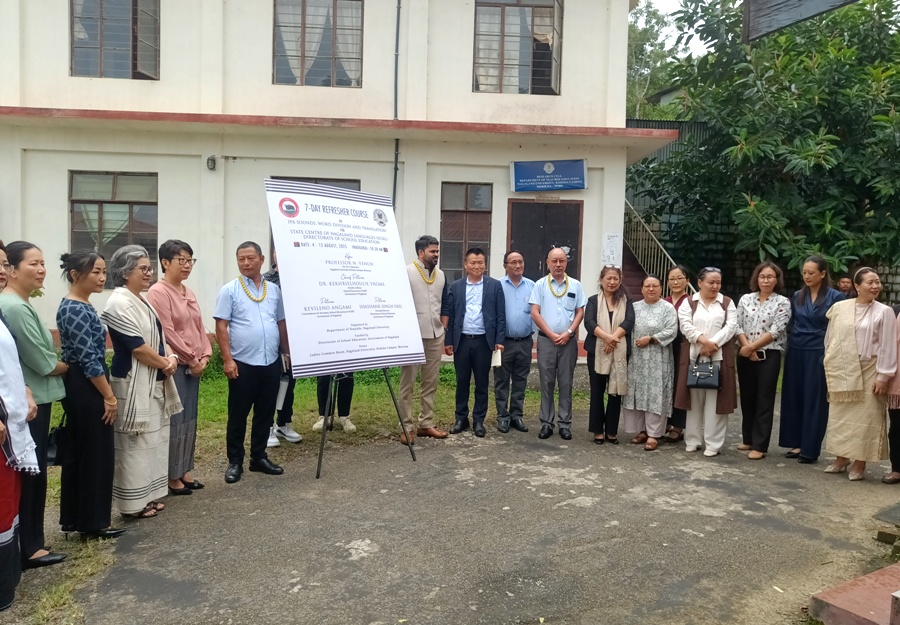SUNDAY, AUGUST 31, 2025
- Home
- Nagaland school education department begins preliminary work on higher education textbooks in tribal languages
Nagaland school education department begins preliminary work on higher education textbooks in tribal languages
Nagaland begins preliminary work to develop tribal language textbooks for higher education as part of its NEP implementation.
Published on Aug 4, 2025
Share

KOHIMA — Kekhrielhoulie Yhome, Advisor of School Education and SCERT, has said that the department is in the preliminary stage of developing textbooks in different tribal languages to introduce mother tongue subjects at the higher education level.
He was speaking at the inaugural session of a seven-day refresher course on IPA sounds, word division, and translation, organised by the State Centre of Nagaland Languages (SCNL), Directorate of School Education, at Nagaland University Kohima Campus, Meriema, on Monday.
The programme, organised by the department of Tenyidie, Nagaland University, and funded by the Directorate of School Education, will conclude on August 12.
Yhome said identity and language are crucial, especially for communities without a written script or recorded history. He stated that the Department of School Education is in regular contact with various literature boards.
He noted that only Tenyidie has a doctoral-level programme in the state, and many other tribal languages still need to be developed. He said the department has started work on tribal language textbooks, acknowledging that while the effort remains in its early stages and faces challenges, it is nonetheless important.
While the National Education Policy (NEP) recommends that children be taught in their mother tongue, he acknowledged the difficulty in implementation due to lack of readiness. He noted that although 18 languages are recognised in Nagaland, the linguistic diversity across tribes makes the exercise challenging.
Read more: Nagaland Board of School Education informs schools of new Naga language primers
He also said that in Nagaland, the translation of the Bible into mother tongues has become a benchmark for language development. He added that churches, households, and emerging departments are contributing to the promotion of indigenous languages, calling it an encouraging trend.
Describing the refresher course as a ‘baby step’ towards promoting the languages, Yhome said the department’s efforts are constrained by a shortage of resource persons.
“We want to develop our textbooks and languages, but our hands are tied,” he said, adding that the government is trying to mobilise support. He stressed the importance of translation, citing the limited vocabulary available in mother tongues.
He further noted that Artificial Intelligence is poised to have a major impact on language development and said the department is exploring collaborations to establish AI labs to accelerate this process. He urged Nagaland University to support these efforts by facilitating such infrastructure.
Certificate courses in mother tongues
Kevileno Angami, Commissioner and Secretary of School Education and SCERT, said that since 2017, 18 mother tongues have been taught as subjects from Class 1 to 8, while four are offered from Class 9 to 12.
She said that, as per an assurance made in the state assembly, the government is now required to introduce mother tongue subjects for the remaining dialects at the secondary level. In this regard, the department, with the support of Nagaland University, is working on developing textbooks for Class 9 and above.
She acknowledged that while there are language officers, there are several limitations and challenges. The department is now focusing on developing grammar for all tribal languages, she said.
Also read: MLA Dr. Rhutso calls for recognition of tribal languages to boost employment opportunities
Angami pointed out that implementing NEP’s directive to teach in the mother tongue is challenging due to the shortage of qualified teachers. “When we have not introduced studies of the language beyond Class 8, it is difficult to get qualified teachers,” she said. However, she expressed hope that the ongoing training would help equip existing teachers in schools.
She added that the department will collaborate with the Ura Academy, literature boards, and Nagaland University to offer certificate courses to strengthen the capacity of teachers. “While talking about preserving and promoting languages, we should keep in mind that preservation and promotion should not lead to disunity amongst ourselves,” she said, urging sensitivity in such efforts.
Prof. N Venuh, Pro Vice-Chancellor of Nagaland University Kohima Campus, welcomed the initiative and emphasised the importance of language in education. He also spoke on the role of language officers in both society and the education system.
Shashank Singh, Principal Director of School Education, highlighted the rationale behind using mother tongue as the medium of instruction up to Class 5. He said this fosters greater interaction between students and teachers and leads to improved learning outcomes. He added that the government envisions developing textbooks in 18 languages up to Class 12.

